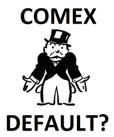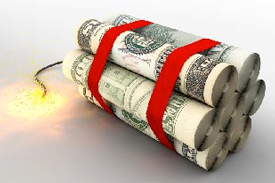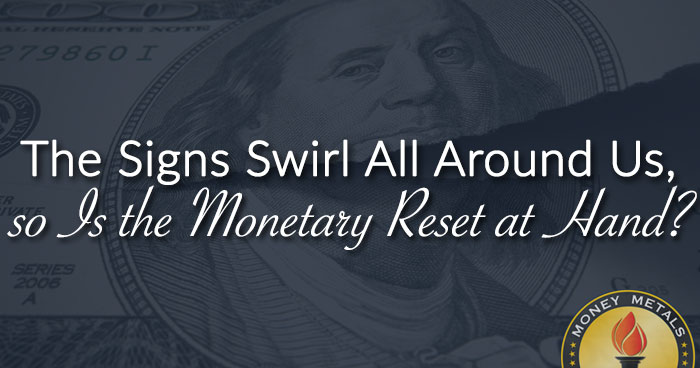For most of this decade owning gold and gold-related investments has required the patience of Job, and the sector is so obscure that it is hard to be sure of anything.
But for months now the unusual developments have been piling up so much that it may be possible to regain some optimism.
There are indications of a shortage of metal not just at the New York Commodities Exchange, where for months now most contracts have been settled through a supposedly "emergency" procedure called "exchange for physicals," but also in London, the hub of the world gold market, where the usual flow of metal to Switzerland recently reversed, with metal flowing back to London amid increasing demand.
This corresponded with announcements of gold acquisitions by central banks that had not shown any interest in gold.
For months, the usual central bank-inspired smashes in the gold futures markets have not been having much effect, even as Gold Anti-Trust Action Committee (GATA) consultant Robert Lambourne has reported increasing intervention in the market by the Bank for International Settlements.
The Comex has just quickly authorized a vast expansion in what bullion banks can use as collateral for their selling – "pledged gold" held off the exchange, supposedly in London, for whose existence and unimpairment there is no public evidence.
Amid these indications of shortages, the open interest in gold futures on the Comex keeps hitting record highs. The bullion banks selling the contracts seem to be acting as if the gold supply itself is infinite, not just the supply of gold paper.
Or maybe they are acting as if they have confidence that when real metal is exhausted, as it was in early 1968 when the previous gold price suppression scheme, the London Gold Pool, faltered and then collapsed, they will be immunized by a declaration of force majeure, cash settlement, an official revaluation of gold, and even capital controls on the monetary metal.
Any prediction about the gold price is of course just a guess.
But the developments described here are facts and surreptitious intervention against gold is longstanding Western government policy amply documented by the GATA and confirmed by the refusal of the U.S. Treasury Department, Federal Reserve System, and Commodity Futures Trading Commission to answer some specific questions we have posed along with U.S. Rep. Alex X. Mooney of West Virginia.
Governments less enthusiastic about this market rigging have been on to it at least since 2004 when the Bank of Russia's deputy chairman, Oleg V. Mozhaiskov, annoyed the London Bullion Market Association's meeting in Moscow by mentioning GATA's work.

This Russian central banker called the gold price "enigmatic" and slyly confessing to suspicion that "the real forces acting on the gold market are far from those of classic textbooks that explain to students how prices are born in a free market."
It is hardly a stretch to suggest that these other governments, including Russia and China, have been acting on Mozhaiskov's suspicion.
Indeed, the U.S. economists Paul Brodsky and Lee Quaintance hypothesized seven years ago that gold price suppression had become part of a central banking plan to redistribute world gold reserves in anticipation of an international currency reset that would push the gold price way up to hedge central banks against currency devaluations.
The infinite money lately being created and distributed by the Federal Reserve Bank of New York means infinite leverage in the markets, infinite market rigging, infinite speculation, infinite misallocation of capital, and infinite corruption.
But for infinite money creation to succeed, it requires infinite commodity price suppression, or else government currencies are ruined.
So what happens if the primary monetary commodity – gold – runs out, as it more or less did upon the collapse of the London Gold Pool in 1968 and the government-ordered suspension of the world's main gold market?
Does that lead to von Mises' crackup boom, a flight to hard assets?

Perhaps no one knows. But "what has been will be again, what has been done will be done again, and there is nothing new under the sun."
Governments rig markets and particularly the monetary metals markets to sustain their power.
Governments undertake various forms of war against each other – military, political, and economic – to gain or restrict power.
And as his deputy explained to Secretary of State Henry Kissinger at the State Department in 1974, control of the gold price is control of the world, and gold is the secret knowledge of the financial universe.
The signs swirl all around us even as mainstream news organizations strive to ignore them and governments and central banks refuse to discuss them. So let us confidently hope that a little more light will come into the world again soon.

About the Author:
Chris Powell is a political columnist and former managing editor at the Journal Inquirer, a daily newspaper in Manchester, Connecticut, USA, where he has worked since graduating from high school in 1967. His column is published in newspapers throughout Connecticut. He is also secretary/treasurer of the Gold Anti-Trust Action Committee Inc., (GATA) which he co-founded in 1999 to expose and oppose the rigging of the gold market by Western central banks and their investment bank agents.





